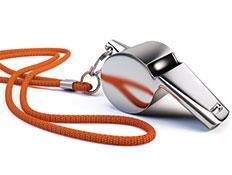If the recent FIFA corruption crisis has taught us anything, it is that allegations of bribery and corruption are high on the agendas of international prosecutors.

It is a requirement for businesses in all industries to double-check their knowledge and application of the rules and regulations that apply to them under the Bribery Act 2010, Proceeds of Crime Act 2002 (POCA) and Money Laundering Regulations 2007 (MLRs), not to mention any overseas financial crime legislation if a business operates abroad.
An individual or organisation who secured any FIFA-related business (such as marketing or media rights) or simply had dealings with FIFA would be wise to investigate the basis upon which the business was obtained. Being forewarned is being forearmed and it would be prudent to ensure that any business obtained was not obtained improperly.
The Bribery Act creates criminal offences with draconian penalties against those who pay or receive bribes. A corporate offence can be committed by commercial organisations for failing to have adequate procedures in place to prevent bribery. The offences can be committed by businesses in the UK (or those with a ‘close connection’ to the UK) and can impose a criminal liability even if bribes are paid abroad and even if they are paid by agents or counterparties.
News of money laundering allegations by Swiss prosecutors as part of the FIFA investigation is hardly surprising. In the UK, the movement or use of criminal property by a recipient or other individuals or corporates, knowing or suspecting that it is criminal property (ie property derived directly or indirectly from criminal conduct), could be considered money laundering under POCA. So in major financial crime investigation, it is not uncommon to see spin-off investigations where property or money derived from an alleged crime is ‘traced’.
Those in the property industry will be aware of anti-bribery and corruption controls and anti-money laundering obligations, reporting suspicious transactions and obtaining ‘consent’ from the NCA. Those in the ‘regulated sector’ (for example, estate agents) will be all too familiar with the onerous additional requirements of the MLRs such as customer due diligence. But failure to comply with the regulations can result in the commission of a criminal offence, with liability
not just limited to the corporate entity, but also with key officers, who, if they are found to be at fault, can also face personal criminal liability.
On top of the risk of penalties (fines, costs, imprisonment at worst, and for corporates, trade sanctions), becoming embroiled in a public news story is disastrous for reputations, share prices can dip, investigations are costly to deal with, staff are unsettled and relations sour with shareholders, stakeholders and business partners. However, nowadays broad and intrusive investigations for some are a harsh reality, even for businesses working hard to turn a legitimate profit in difficult markets.
If you have concerns or doubts about your due diligence against financial crime, then it would be a good idea to dive deeper. That way you may divert a FIFA-like investigation final whistle.
Andrew Wallis is an associate in the regulatory team at law firm Irwin Mitchell






























No comments yet